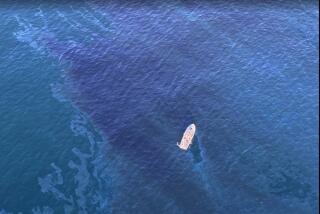Commentary : Orange County’s Worst Oil Spill Should Become a Learning Situation
- Share via
Feb. 7, 1990, will be a day that Orange Countians will remember for some time to come. On that day, approximately 400,000 gallons of oil began spewing from the American Trader, an 800-foot tanker operated by British Petroleum. The disaster is the worst oil spill in the history of Orange County.
The spill was the direct result of a single-hulled tanker being damaged by its own anchor as it was moored off Huntington Beach, ready to deposit its oil in the underground pipe system serving the oil industry of Southern California.
The first incredible response to that situation should be: “Why are we allowing single-hulled tankers to be transporting crude oil so close to shore in an area where shipping traffic is very heavy and recreation and tourism are extremely important?”
Had that tanker been double-hulled, the spill probably would not have happened. However, the oil industry and its very powerful lobbyists in Washington have been successful in their efforts opposing double-hulled ships, thus allowing the continued operation of these somewhat fragile single-hulled vessels in near-shore waters at the risk of the shoreline and the environment.
We are fortunate that mother nature looked favorably upon us, playing a very important role in the clean-up operation. The extremely positive weather conditions saved the Orange County coast from a much worse disaster. Had we been in the throes of winter storms, that oil could have devastated the entire Orange County coast.
What have we learned from the clean-up operation? That there are just a few ways to remove the oil from the surface of the ocean. It can be burned away. It can be skimmed from the top. It can be laden with chemicals to disperse it and it can be sopped up with certain types of absorbent materials.
Given the fact that Orange County’s air quality is some of the worst in the nation, we would not want to burn off the oil at the risk of increasing Orange County’s smog. The chemical dispersal also creates some very serious hazards to the environment and the food chain that render it inadvisable.
Skimming the oil off the water seemed to be the best way to recover the oil. However, it is very slow, laborious and not extremely efficient. That process also does not work well with “thin” oil or in extremely shallow water. Many of the methods of absorbing the oil still are experimental and have not been fully tested, so we are not aware of all the pros and cons.
It is amazing that in 1990, with the kind of technology this country has utilized in many areas, we still have these quite primitive ways of recovering oil from the water. We cannot work at night, all cleanup methods are ineffective in rough seas and most methods are extremely labor-intensive.
In other words, the technology has not been developed to handle a spill even the size of this one, and that, to me, is deplorable. We should not be offering the leasing of tracts off Orange County when we are unable to effectively clean up from a disaster that oil development and the oil industry may produce.
We have also learned that the process of handling the disaster needs a lot more coordination. Federal, state and local government agencies need to come together to preplan for such a disaster. We need a communications network with a centralized disaster headquarters for local agencies to pool their resources, obtain information, handle questions and concerns, and make effective decisions in terms of cleanup operations.
We need to view this situation much like a civil defense emergency. It seems as though we have not done so. There are various agencies involved in the cleanup operation, each having its own specific responsibility and authority. Local government resources have been available, but in many cases not utilized to the fullest extent.
We need to use this situation as a learning tool for potential spills that may occur in the future if the people continue to allow the expansion of the oil industry here in Orange County.
The main lesson learned in this disaster is that we need much stricter laws governing the transport of oil near our shores and we need to take a very hard look at the expansion of this industry in Orange County. Every federal, state and local government official in Orange County needs to be familiar with, and supportive of, federal and state law currently pending that would require double-hulled ships and an effective clean-up procedure.
U.S. Rep. Barbara Boxer (D-Greenbrae) has initiated the Ocean Protection Act (HR 3751), which would protect the California coast from the shoreline out 145 miles. Every member of our Orange County delegation needs to sign on to that piece of legislation.
Local governments need to take a position on providing onshore support facilities for offshore drilling (pipelines, refineries, etc.). I believe the area between the Orange County coastline and Catalina Island should be designated a National Oceanic Park. That plan already has the support of half of the cities in the county and the Orange County Board of Supervisors.
The people of Orange County must realize that the strong oil lobby tightly connected with the current and previous administrations has produced a situation where the checks and balances just are not there.
The people of Orange County need to express their opinion about the future of this industry in our county and express their opinion about the way and the reasons this disaster happened to be sure it does not happen again.
More to Read
Sign up for Essential California
The most important California stories and recommendations in your inbox every morning.
You may occasionally receive promotional content from the Los Angeles Times.













